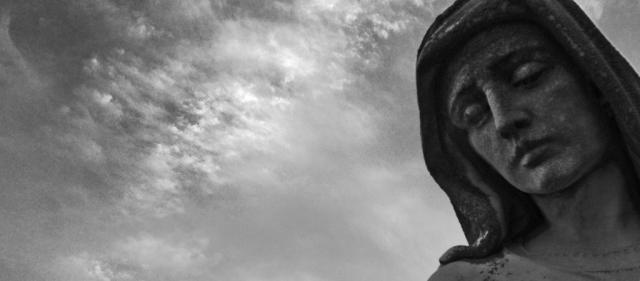We barely give Mary much thought. Yet, she was once universally popular.

October 31, 2017 marks the 500th anniversary of the Protestant Reformation, an important date in the history of the United Church and for Reformed Churches around the world. To commemorate the occasion, we are publishing a series of blog posts by Trisha Elliott on "What Makes Us Protestant." Take a look at all the blog posts in this series.
In the churches I’ve served, Mary makes an appearance a couple times a year: when Mary’s Song, also known as the Magnificat (Luke 1:46‒55), is read during the season of Advent, and when Mary’s propped up in a crèche in the snow or at the front of the church in the weeks before Christmas.
Other than that, we barely give Mary much thought. Yet, she was once universally popular.
For the first thousand years of Christianity, and particularly since the Council of Ephesus in 431, Mary has held a special place in Christian faith as Theotokos, or “Bearer of God.” But for just as long, there has been debate about how “special” that place ought to be.
The Protestant reformers didn’t have a beef with Mary per se. Some of the leading Protestant reformers like Martin Luther, John Calvin, and Ulrich Zwingli all believed Mary was important. But they thought it was theologically wrong to treat Mary as God’s mediator or to call on her to intervene for God. They objected to the way Mary sometimes took the place of Christ in popular devotions and perceived her elevation as a form of idolatry, or “mariolatry” as some put it. Incidentally, there were Roman Catholics at the time who thought similarly.
But what really rankled the reformers was how Mary was exploited to sell indulgences and the way worshippers were promised entry into heaven through her. In short, the reformers perceived Mary as exploited and her role as inflated. The upshot is that Mary has held a less prominent position in Protestantism ever since.
But there’s something about Mary…
There’s something about how she shows up as the mother of Jesus, at Jesus’ first miracle at Cana, at the foot of the cross. There’s something in her that prompts us to think about how we bring Christ into the world, how we “treasure and ponder” God’s words, and how we boldly sing the truth: “He has brought down the powerful from their thrones, and lifted up the lowly…” There’s something about how ordinary Mary is and how divinity can be born of someone as average as you and me.
What do you think?
1. How important is Mary in your understanding of Christianity?
2. What words of Mary’s song (Luke 1:46‒55) most resonate with you?
3. How do you think your prayers “reach” God?
—Rev. Trisha Elliott, Southminster Pastoral Charge, Ottawa
For worship materials for Reformation Sunday—including a bulletin insert for the 500th anniversary of the Protestant Reformation on October 31, 2017—see the Worship section.